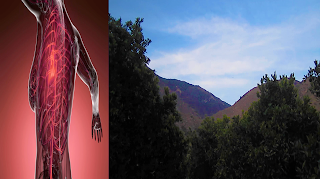Both Gush and Desert Dreaming form part of the BFI London Film Festival's Experimenta strand, where they feature alongside the likes of Filipino filmmaker John Torres' Room in a Crowd and Ukrainian animated tale It Can't Be That Nothing That Can Be Returned. Experimenta, which traditionally sees the bulk of its screenings crammed into the final couple of days of the LFF, generally throws up some fascinating stuff, often at a point when burned-out festival goers are in dire need of a palate-cleansing experience. Most of the titles shown in Experimenta present something radically different from the narrative cinema that forms a sizeable percentage of the LFF's fare, and the strand stands as an invigorating part of the festival programme. You can even buy an Experimenta pass—which admits you to three screenings of your choice—for just £24.
Fox Maxy's debut feature Gush—which screens on Saturday, October 14—arrives at the LFF in the midst of a buzz that has been steadily growing since the film premiered at this year's Sundance, where it played in the New Frontier strand. Prior to Gush, Maxy directed a number of short films—most notably Maat Means Land, Blood Materials and F1ghting Looks Different 2 Me Now—and saw her work selected for several international film festivals, including Rotterdam and Toronto. Yet Gush very much feels like the film Maxy has been building to all along, as it draws from around a decade's worth of the filmmaker's personal footage, much of which predates the earliest of her shorts. With its frenetic barrage of sounds and colours, the kaleidoscopic, overloaded Gush somehow manages to be at once personal and alienating; while F1ghting Looks Different 2 Me Now combined similar imagery with a discernible point about the Mesa Grande Indian Reservation, Maxy's latest provides fewer clues as to what the takeaway should be.
It's quite clear that much—if not all—that's presented here holds real meaning for Maxy, yet it is difficult for the viewer to link the various motifs scattered throughout the film's chaotic 71 minutes. Like many an experimental film, Gush appears to have been made without its consumption in mind, almost as if any consideration of audience might lead to a dilution of the artist's original vision. Which is not to say that others aren't welcome to come along for the ride, and the suberbly-edited Gush, despite its singularity, makes for an absorbing experience. Yet Maxy's film will punish anyone looking for a semblance of narrative: while our instincts might tell us to both attempt to join the dots and impose a three-act structure, this slippery film requires a rewiring of cinematic expectations if we are to navigate it without frustration taking hold. Gush is a bold, fitfully impressive work, one that careens to a memorable conclusion featuring inspired use of The Cure's "The Perfect Girl".
Abdul Halik Azeez's Desert Dreaming screens at the LFF on Sunday, October 15—which marks the close of this year's edition—when it plays as one of five titles included in The Land is the Living Witness, an Experimenta programme centring on colonial histories and migration routes. Azeez's film is specifically concerned with migration from Sri Lanka to the Middle East, and it begins with a conversation in which a man details his perilous travels through Iran and Pakistan. While we're listening to this story, we're watching someone carry out some very basic photoshopping, which culminates in figures being pasted against a variety of international backgrounds; as these crudely hewn globetrotters float around, the dialogue is supplanted by music from M. G. Ramachandran's 1973 film World Roaming Bachelor. As experimental shorts go, Desert Dreaming—like the aforementioned F1ghting Looks Different 2 Me Now—is a relatively direct example, and as such it stands as a fine entry point into the world of non-narrative film.





